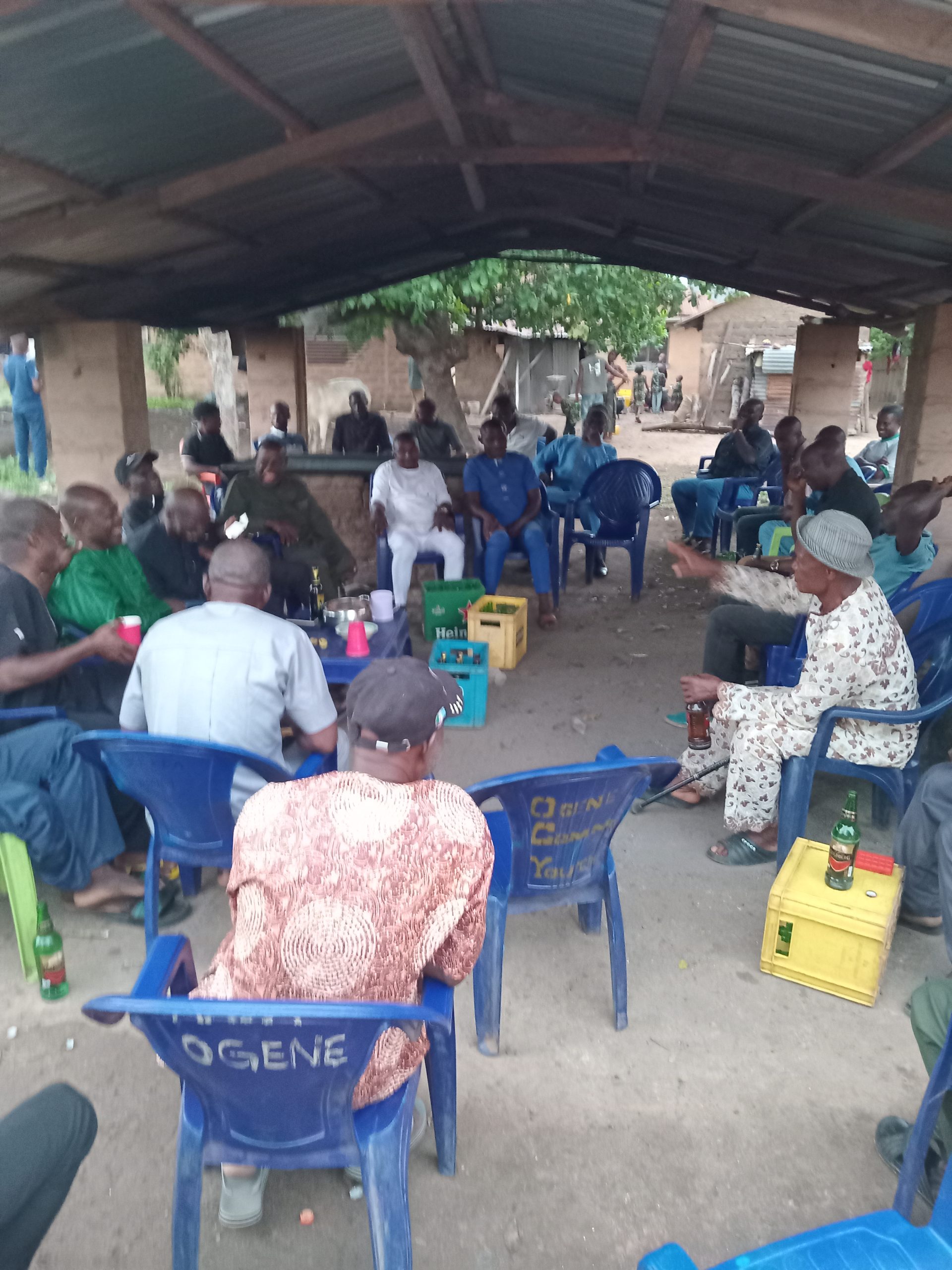By Adagbo Onoja
In a world heading with great speed from inter-national to inter-cosmological relations, the folk witticism unleashed by the trio of Michael Agbam, Adoyi Okoh and Ejembi Aba is deserving of a separate report from the burial of Enem Ikponya aka Ojongo at Ogene Amejo in Okpokwu LGA of Benue State from May 15th to May 17th, 2025, with particular reference to the layers of meaning the tales embody and their performative outcomes. Agbam who retired recently as a Director from the Benue State Civil Service came as head of a team to solidarise with the bereaved at the burial on May 17th. So also Adoyi Okoh who retired not long ago too from the services of Benue State Polytechnic, Ugbokolo where he taught Office Technology and Management. Ejembi Aba is a tough, indispensable but complicated community leader at Ogene Village.
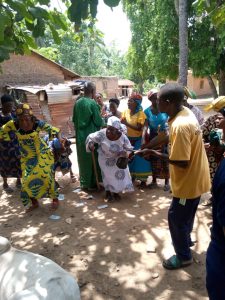
The ‘new’ Adikwu Olekwu in yellow T-Shirt?
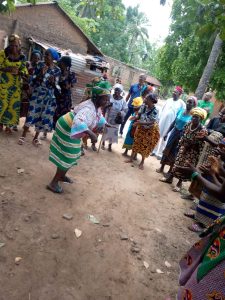
Taking the floor!
Agbam arrived at the time those staging the ‘Olena yawu Okunno’ dance were at the peak of their specialty. The dance is almost extinct. The generation that knew what it meant is gone. But without it, Enem Ikponya’s burial would have been incomplete. It was the only symbolic enough way for some of us to say ‘thank you’ to her. So, Ejembi Aba, Adulugba Okpeh and Pius Agbo, the folks who still have good ideas of how it played out were consulted. It was they who put in place the arrangement. It was a shadow of the performance in those days when some of us were growing up. There is no way anyone can replicate the late Adikwu Olekwu’s grip of one of the instruments used for the dance. What is, however, intriguing is how far the young man who handled the instrument on May 17th, 2025 went. It is most unlikely he had been born during Adikwu Olekwu’s time. Systems die hard, indeed!
Agbam and his fellow travelers arrived at the peak of this dance and joined in appreciating the women involved, the women dancing around the cow which is the symbol of Enem Ikponya’s magnitude or high mindedness being appreciated. Thereafter, Agbam, his team and other solidarisers who had also arrived settled under a tree in the open space. People in the audience who had done great deeds sometimes back were being recognised. Dr. Yusuf Igomu, a federal operative noted for his generousity of spirit was particularly singled out for praises. Chief Fred Ellah got excellent mention by those he helped previously while in the service of the Ahmadu Bello University Teaching Hospital, Zaria before his retirement. So also Joe Adulugba, a former Chairperson of the Edumoga Development Association (EDEMA) and Dr Okpeh Alleh Okpeh of the University of Abuja who, unlike Adulugba, got both praise and friendly battering now and then. Adulugba was constantly praised for maintaining a balance between his lower part of the District and the upper part where he grew up in the District Headquarters. That went on for quite sometime before the rains started, forcing a shift to another shed, still an open space. Shortly after, Adoyi Okoh arrived with another team, three of them from the lower part of Edumoga District.
With Adoyi and the nicknaming between him and Ejembi Aba, the discussion began to shift from individuals to the sort of witticism that defines Adoyi. Every interjection of his brought the audience to a bout of explosive laughter. And this was throughout the rest of the evening. The atmosphere was heightened by the clash of witticism between Adoyi, Agbam and Ejembi Aba. However, by the time Ejembi left around 8 pm, he had conceded defeat twice, declaring that Adoyi is unbeatable.
What makes him thick is not any particular tale but his narrativity. His grammar, concepts and usages are uniquely his. Working on a PhD thesis that relies on the same stuff as they apply to critical geopolitics, this reporter quickly came to the conclusion that the clash of witticism is a different dimension of the burial. And that if Adoyi, Ejembi and Agbam were to spend three to six months with Prof Sola Olorunyomi at the Institute of African Studies at the University of Ibadan or somewhere such as the African Studies Centre at the University of Leiden in Netherland, they will come out with an ontological statement that will keep the world busy for a long time as far as the African worldview is concerned. The question is who takes up this challenge?
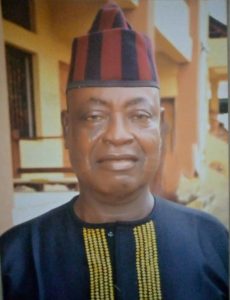
Adoyi G. Okoh

Ejembi D Aba
What sort of things does Adoyi Okoh convey? It is difficult to capture what he says because conventional English has not developed the grammar to capture the variables in the tales. But a sample or two is possible. Once upon a time, friendship developed between the ‘liar of the world of the living’ and the ‘liar of the world of the dead’. Both were hunters. The friendship developed through a test of strength in which the ‘liar of the world of the living’ suffered an initial defeat but after which they came to discover themselves and decided that friendship between them had beneficial prospects.
One day, the ‘liar of the world of the dead’ suggested a visit to his counterpart. A date was agreed upon. However, the wife of the ‘liar of the world of the living’ who had been pregnant delivered a baby a few days before the D-date. The new child warned as well as advised the parents and everyone else in the household of the ‘liar of the world of the living’ to leave it alone and disappear from the house before the ‘liar of the world of the dead’ arrived. The astonished parents came to grips with the power of the new child and did as it said such that when the ‘liar of the world of the dead’ arrived, it was only the child he found. He learnt from the child that everyone had gone out.
On what each of the members of the household had gone out for, the child told the ‘liar of the world of the dead’ that his father had gone to buy troublesomeness on top of troublesomeness; his brother to exchange death with life while the mother had gone to have a contest with God. The ‘liar of the world of the dead’ who could not make sense of what he heard asked for explanation. The child told him the father went out to marry a second wife, the brother to plant new seeds and the mother to deliver a baby.
The ‘liar of the world of the dead’ then opted to leave a message for his friend, the ‘liar of the world of the living’, asking him to visit him nine days from that date and to come with ‘eje teje’ (meaning later). On getting the message upon his return home, ‘liar of the world of the living’ set out in search of ‘eje teje’. Five days on it, he had made no progress and was getting worried about the prospects of getting it at all. It was at that point he ran into Eeba, a Mr. handsome and told him his worries. Eeba laughed and told him there is no such thing as ‘eje teje’ beyond a ploy to kill the ‘liar of the world of the living’. That his option is to send a message to his friend the ‘liar of the world of the dead’ to the effect that he has got the ‘eje teje’ but that he (‘liar of the world of the dead’) should visit him and lead him because he (the ‘liar of the world of the living’) could not find his way to the world of the dead. However, in coming, he should neither arrive in the morning nor afternoon and certainly not at midnight. He should come by ‘eko teko’ which I have no English equivalent). In coming too, he should not do so by train, airplane or ship. Rather, he should come by ‘egba tegba’ (this too I have no English equivalent yet).
The ‘liar of the world of the dead’ immediately suspected Eeba and struck him dead upon his return to the world of the dead in spite of Eeba’s denial of complicity. Whereupon as he breathed his last, Eeba vowed to keep revealing the world of the dead. That is why the first thing the soothsayer in the Idoma world says, irrespective of the subject matter on which consultation has been sought, is the complicity of the ‘Alekwu’ (the dead or ancestors or the spirit world).

Adagbo with some of the women dancers
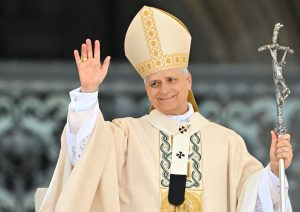
Isn’t Pope Leo XIV saying to Africa: Come unto me, all ye who labour and are heavy laden?
It is the layers of meaning or the allegorical character of the tales that makes them to be the starting point for decolonial theorising of the African predicament. Interestingly, Pope Leo XIV has given a powerful blessing to decoloniality if what one heard in his reply to Capt. Ibrahim Traore is not a Russian AI production. If that statement did, indeed, come from the incumbent Pope, then he has made history because it is doubtful if any other statement can rival it in the 20th and 21st centuries, rubbishing all the imaginative geographies pioneered by the Church, Kant, Hume, Rousseau, Hegel, Marx, Huntington and a host of them and upon which Europe based its colonial warfare. Of course, Pope Francis started it in January 2023 with his speech in the DRC but it is Pope Leo who went full blast on the complicity of Christianity in the politics of Empire. In that statement lies the very plausible emergence of the Catholic Church as the strongest of all contenders in the 21st century, depending of course on how the rest of the Church re-inscribes the Pope.
In that context, the ontological snippets in these tales become the cornerstone of the African subjectivity as opposed to unthinking Christianity of yore which devalued indigenous ways of knowing. Thanks to Pope Leo XIV!
Notwithstanding the nuggets of anti-feminist slants such as equating women with troublesomeness, there are revealing strands in the fable such as the patterns of relationship between the dead and the living, the impossibility of finality or closure, the complexity of difference and heterogeneity in the African world. In other words, man is not the measure of all things in the African world in contrast to Europe or the Western world, for example. Man or the human being is just one of the variables and is not even the most important. Spirits, rivers, mountains and even the sky are also actors. This is what posthumanists are just recognising in the Western world where it is still a big theoretical controversy. If Africa does not study these ontological vibes, a thousand Pope Leo cannot effect their liberation.
Let’s take one stuff from Adoyi Okoh’s tales. Once upon a time (bringing in the impreciseness of temporality in Africa, again in contrast to Europe’s universal), there lived a wealthy lawyer who used his wealth to tar all communal roads, build a palace for the king and awarded scholarship to as many beneficiaries as was possible. He then said it was time for him to marry which he did with a Yoruba woman. However, he was found dead on his bed seven days after his wedding. There was massive outpouring of grief. A king from somewhere else arrived to say he had an idea of what could bring him back to life if anyone of the mourners could do what was required. They all urged him on, indicating readiness to do whatever it would require to bring him back to life. A big fire sprouted and if anyone entered would bring the lawyer back to life, so said the stranger king. It turned out that not a single person could enter the fire. At that point, the wife was being escorted by her friends as communards do to the bereaved. She saw the fire, asked what it was all about and chose to enter the fire. Lo and behold, the dead lawyer came back to life but with a tortoise in his hands. The stranger king told him not to hit the tortoise on the ground because if he did, his wife who entered and perished in the fire would come back to life but his two brothers would die. The lawyer wasted no time in hitting the tortoise on the ground, followed by the death of his two brothers and the rise from death of his wife, marking the beginning of a new life.
Before the decolonial rise in social theory, these were the sort of tales dismissed as mark of primitivity or idol worship by Enlightenment narratives. But, as Muazu Maiwada, the Ahmadu Bello University, Zaria literary theorist, would say, what is the difference between commanding the mountain or a tree to do certain things on the one hand and AI on the other. They all follow the same principles. So, like the previous tale, this one also has layers of meaning, as many as every reader makes of it. What is interesting is that Adoyi, Ejembi Aba and Michael Agbam have torrents of them. Although Ejembi Aba was defeated by Adoyi, he is no push over. Agbam is, on the other hand, the moderator, with his own stock of them except that Adoyi Okoh’s dexterity is unsurpassable or hard to. His coinages and delivery create new meanings along the line. All over Africa, this is what one finds, with Achebe as the chief rapporteur when, in Things Fall Apart, he compared wisdom to the goatskin bag. Everyone carries his own, meaning that, in much of Africa, there is no finality or higher wisdom in itself. Everything is relational. Notwithstanding what the Amos Tutuolas, Achebes, Soyinkas, Ngugis and so on have done with their works, only very few of these tales have been documented, scrutinised, filtered and produced as texts in popular culture and the starting point of theory and practice in African international relations. That dry ontological background is also the dryness of the foreign policy praxis of African states anchored on concepts and practices African intellectuals of statecraft can never master so well as their Western counterparts.
Even for the ontological witticism alone, Ojongo is still making her contributions while on her way to where dead people go. For that and other reasons, her death and burial remains a completely different experience, contrary to one’s thinking that, as the editorial handler of Intervention’s over-investment in reporting the death of whomever it got to hear of since 2016 when this platform berthed, it won’t be so. The assumption that one has been involved in too many burials across the world in the last nine years on that account as to have been prepared for this didn’t hold.
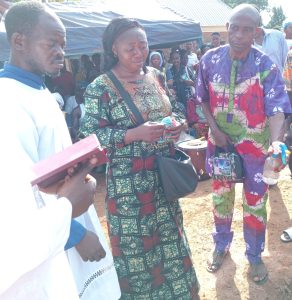
Madam Ithe and Mister Sunday Ogbu Onoja, two of the three surviving Enem Ikponya’s children @ the graveside
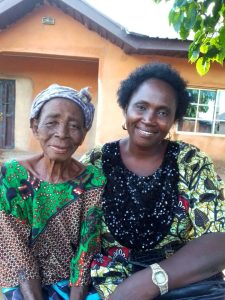
Felicia Ochiga with Enem Ikponya shortly before her death
One was, for instance, totally unprepared for the overwhelming inflow of solidarity calls, text messages right down to huge material support from comrades, activists, diplomats, academics, the media and not a few business men (and women too), at home and abroad. The involving nature of burial today is such that these contributions helped a lot, what with the too many hidden expenses that only emerge in the middle of the burial regime, leaving the chief mourner gasping for financial breath. Then it stretches to the category of people whose material location in the Nigerian economy one thought made it too much of financial stress for them to travel to my place to be at the burial. But they dismissed my argument that, at nearly 90, my mother’s death and burial ought not to disrupt anybody’s daily survival flows. It stretches further to the motorcyclists who heralded the corpse from the mortuary to our compound on May 15th, 2025. Even someone like me who doesn’t prioritise value spectacle could not but admire their dexterity even as I thought the speed was dangerous. But there was no accident. Then it goes to the choir group that were on their feet for two nights non-stop (15th to 16th at Opialu and 16th to 17th at Ogene) and without any material inducement. They present a big challenge because it should be possible to see how great they can turn out if their instrument handlers can be provided the opportunity for further training in Departments of Drama, Music or Cultural Studies and they can produce more diverse outputs. The team that supervised cooking under Felicia Ochiga did a fantastic job. To provide that quality of cooking, flawless service for such a huge and fluid crowd without any hitches is amazing. Onyikwu Onyaidu, Eddi Adoga and Nurse Vera Okoh deserve further mention, being the team that managed Ojongo’s transition. There is, of course, the Ogene elite, particularly the team from Abuja but also the ‘homeboys’. Lastly, there are the two junior brethrens in Makurdi who not only had access to a more considerate cow seller but also sourced the new currency notes from the banks and then who did all the driving throughout. May they remain blessed! The totality is a stunning display of the ‘economy of affection’ the sort of thing the World Bank hates about Africa and does everything to demobilize but unsuccessfully.
Although Ogene, being where we grew up, has never been out of view in one’s communal responsibility, spending five days there at a go has not been part of it since 1975. I stand to be corrected. This burial made that possible. The joy of calling each of them by their first name to their surprise as we came across each other is beyond description, be it Oliko Ogeidu, Martha Elakpa, Ogwa Edigwu, Aladi Abalike, Maria Ayiji, Maria Oobe, Maggie Ekpe, Aggi Clement and a host of them. They thought I would no longer remember their names. No. We resumed our old “quarrels” and the joy in that is only better imagined than mentioned.
But there is the element of sadness in meeting them. Three of them have no less than a dozen children. One woman giving birth to 12 children is, I think, systemically punitive, particularly in the context of rural nutrition. The rural areas is where the foods are, almost complete, from vegetables, fruits, grains, legumes, less starchy tubers such as three-leaves, nuts and all sorts of natural food, almost free even till today. Unfortunately, the dietary orientation is to yams or yam related, not to fruits and things like that. It is worse nowadays compared to our time when we used to pick all manner of stuff from the forests at the back of the house. That must be why we were rarely sick. Now, people in the village fry a lot of their food. Neither commissioners for Information nor of health or local government chairmen think that dietary intelligence and conscientisation is part of their schedule of duties. The implication is that local areas are totally ungoverned. Their only encounter with law and order is the oppressive routine encounters with either tax collectors on market days or the police. Tragically, quality politicians do not contest to be elected Local Government Chairmen where pastoral character of governance should be best demonstrated. God helps Nigeria!
Safe journey, Ojongo, and greet the Angels of the Lord!

